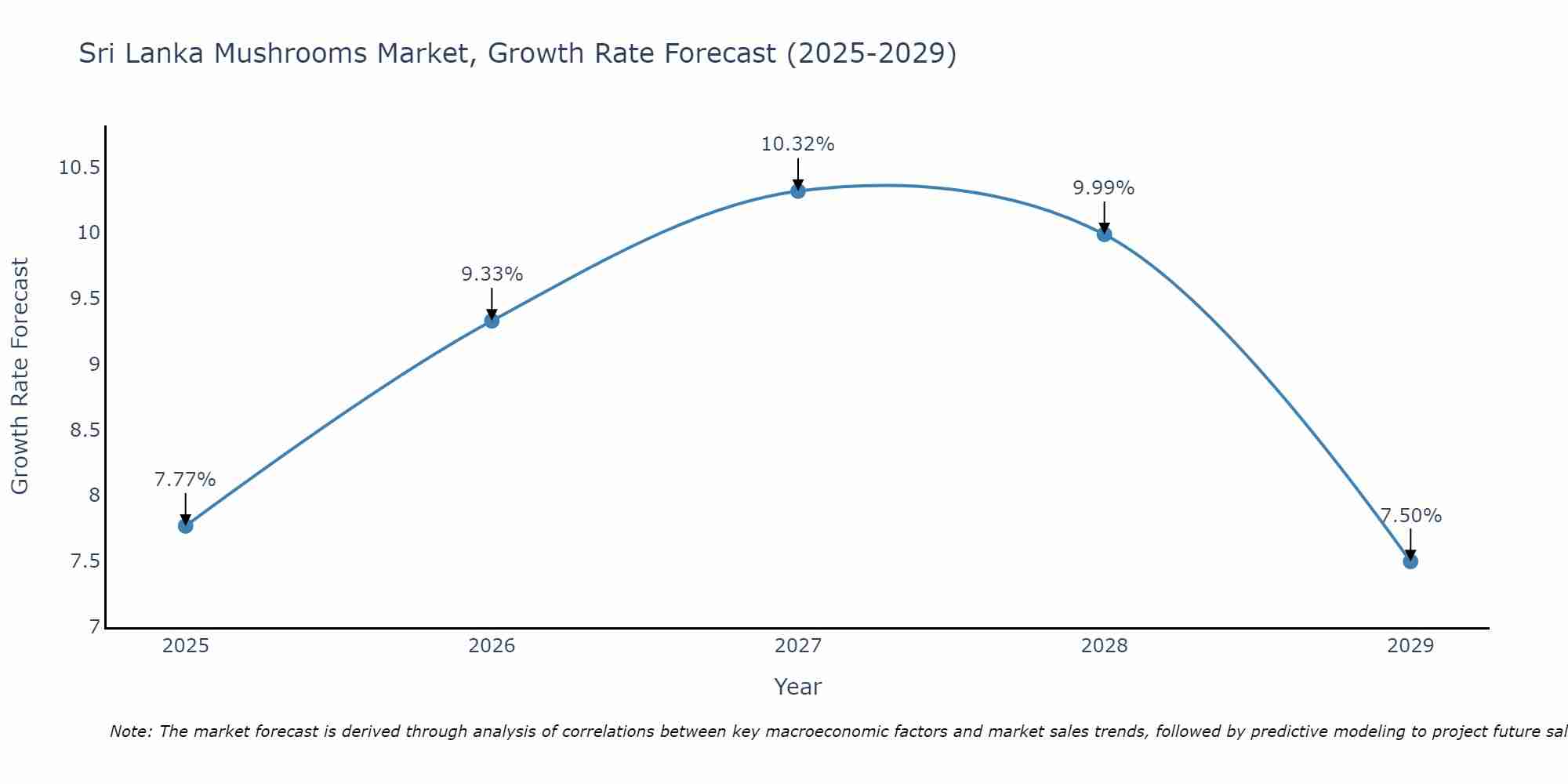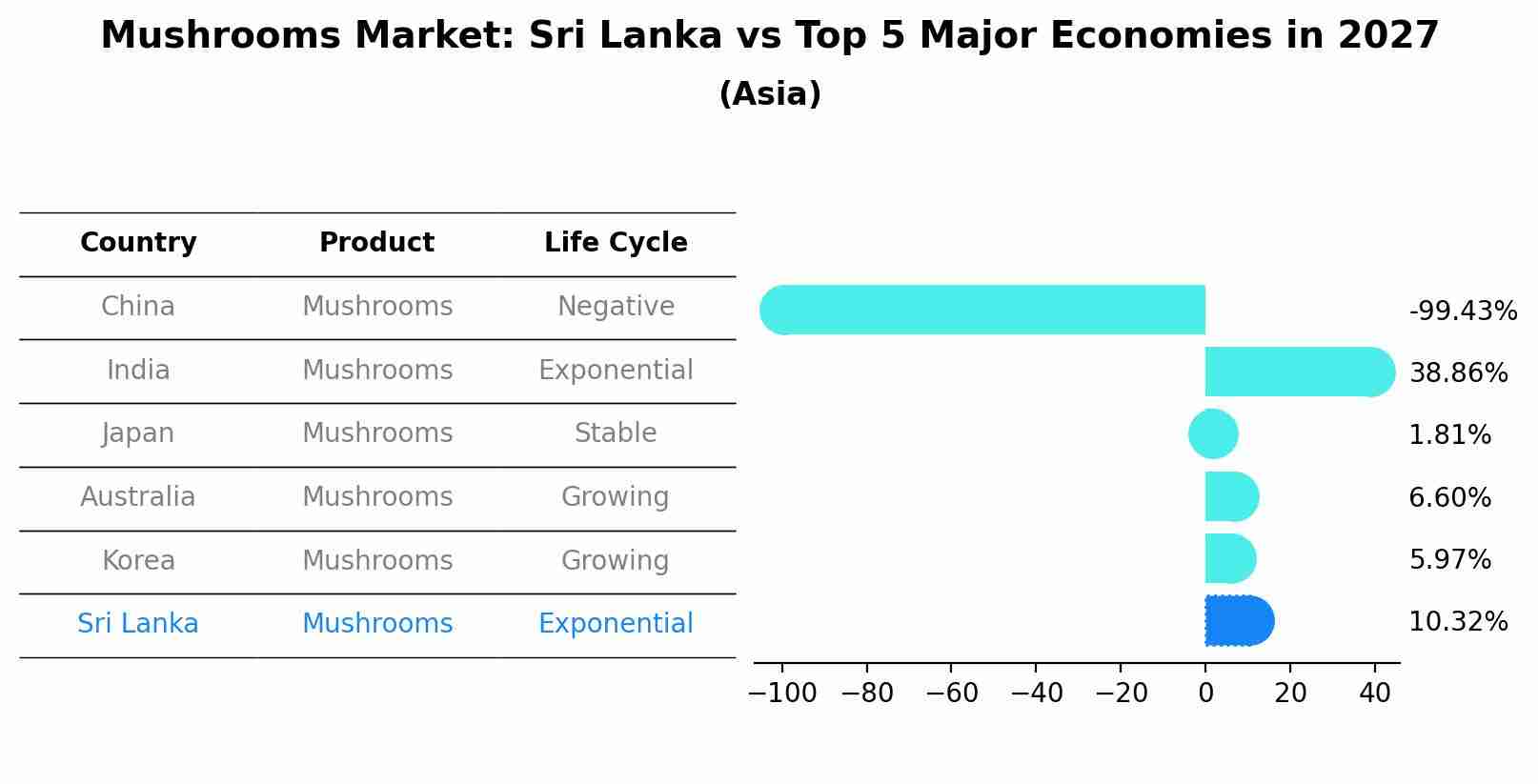Sri Lanka Mushrooms Market (2025-2031) Outlook | Analysis, Revenue, Trends, Companies, Growth, Industry, Forecast, Share, Value & Size
| Product Code: ETC383191 | Publication Date: Aug 2022 | Updated Date: Jul 2025 | Product Type: Market Research Report | |
| Publisher: 6Wresearch | Author: Shubham Padhi | No. of Pages: 75 | No. of Figures: 35 | No. of Tables: 20 |
Sri Lanka Mushrooms Market Size Growth Rate
The Sri Lanka Mushrooms Market is projected to witness mixed growth rate patterns during 2025 to 2029. Starting at 7.77% in 2025, the market peaks at 10.32% in 2027, and settles at 7.50% by 2029.

Mushrooms Market: Sri Lanka vs Top 5 Major Economies in 2027 (Asia)
Sri Lanka's Mushrooms market is anticipated to experience a high growth rate of 10.32% by 2027, reflecting trends observed in the largest economy China, followed by India, Japan, Australia and South Korea.

Sri Lanka Mushrooms Market Synopsis
The Sri Lanka mushrooms market is experiencing steady growth driven by increasing awareness about the health benefits of mushrooms, such as their high nutritional value and medicinal properties. Oyster mushrooms are the most popular variety consumed in Sri Lanka due to their versatility in cooking and mild flavor. The market is primarily composed of small-scale local producers, with a growing trend towards organic cultivation methods. Urban areas, particularly Colombo, dominate the consumption of mushrooms, with a rising demand for exotic varieties like shiitake and enoki among the more affluent population. The market is also witnessing a surge in mushroom-based products, such as powders and supplements, catering to the health-conscious consumer segment. Overall, the Sri Lanka mushrooms market presents opportunities for both local farmers and international exporters looking to capitalize on the growing demand for this nutritious food source.
Sri Lanka Mushrooms Market Trends
The Sri Lanka mushroom market is experiencing significant growth due to increasing awareness of the health benefits associated with mushrooms, such as their high nutritional value and potential medicinal properties. Consumers are showing a growing interest in incorporating mushrooms into their diets as a healthy and sustainable food option. Additionally, the rise of plant-based diets and the shift towards organic and natural products are driving the demand for mushrooms as a meat substitute. Local producers are investing in modern cultivation techniques to meet the rising demand for mushrooms in Sri Lanka. The market is also witnessing a trend towards exotic and specialty mushrooms, offering a wider variety of options for consumers looking for unique flavors and culinary experiences. Overall, the Sri Lanka mushroom market is poised for continued growth in the coming years.
Sri Lanka Mushrooms Market Challenges
In the Sri Lankan mushrooms market, some key challenges include limited consumer awareness and acceptance of mushrooms as a food product, as well as the lack of infrastructure and technology for large-scale mushroom cultivation. Additionally, there is a lack of standardized quality control measures and certifications, which can impact consumer trust and market growth. Limited access to finance and resources for small-scale farmers looking to enter the market also poses a challenge, along with issues related to transportation and distribution networks. Addressing these challenges will be crucial for the sustainable growth of the mushrooms market in Sri Lanka, requiring collaborations between government bodies, industry stakeholders, and research institutions to promote awareness, improve cultivation practices, and enhance market access for local producers.
Sri Lanka Mushrooms Market Investment Opportunities
The Sri Lanka mushrooms market presents promising investment opportunities due to growing consumer awareness of the health benefits and culinary versatility of mushrooms. With an increasing focus on healthy eating and sustainable food sources, there is a rising demand for fresh and processed mushrooms in the country. Investing in mushroom cultivation, processing facilities, and value-added products like mushroom powders, extracts, and snacks could be lucrative. Additionally, the tourism industry in Sri Lanka provides a platform for promoting mushroom-based dishes in restaurants and hotels, further expanding the market. Collaborating with local farmers, implementing modern farming techniques, and establishing distribution networks can help investors capitalize on the growing interest in mushrooms in Sri Lanka.
Jordan Agar Market Government Policies
The Sri Lankan government has implemented various policies to support the growth of the mushrooms market in the country. These include providing financial assistance and subsidies to mushroom farmers, promoting research and development in mushroom cultivation techniques, and offering training programs to educate farmers on best practices. Additionally, the government has focused on creating awareness among consumers about the nutritional benefits of mushrooms to increase domestic consumption. Furthermore, initiatives have been put in place to improve infrastructure for mushroom production and establish quality standards to enhance competitiveness in both domestic and international markets. Overall, these policies aim to boost the mushroom industry in Sri Lanka by supporting farmers, improving production practices, and increasing market demand.
Sri Lanka Mushrooms Market Future Outlook
The Sri Lanka mushrooms market is poised for steady growth in the coming years, driven by increasing consumer awareness of the nutritional benefits and culinary versatility of mushrooms. With a rising trend towards healthier eating habits and a growing interest in plant-based diets, mushrooms are gaining popularity as a nutritious and sustainable food option. Additionally, the expanding hospitality and food service sector in Sri Lanka is creating opportunities for mushroom producers to supply to restaurants and hotels. The government`s support for agriculture and initiatives to promote mushroom cultivation are also expected to contribute to the market`s growth. Overall, the Sri Lanka mushrooms market is likely to see increased demand and investment, making it a promising sector for future development.
Key Highlights of the Report:
- Sri Lanka Mushrooms Market Outlook
- Market Size of Sri Lanka Mushrooms Market, 2024
- Forecast of Sri Lanka Mushrooms Market, 2031
- Historical Data and Forecast of Sri Lanka Mushrooms Revenues & Volume for the Period 2021 - 2031
- Sri Lanka Mushrooms Market Trend Evolution
- Sri Lanka Mushrooms Market Drivers and Challenges
- Sri Lanka Mushrooms Price Trends
- Sri Lanka Mushrooms Porter's Five Forces
- Sri Lanka Mushrooms Industry Life Cycle
- Historical Data and Forecast of Sri Lanka Mushrooms Market Revenues & Volume By Product for the Period 2021 - 2031
- Historical Data and Forecast of Sri Lanka Mushrooms Market Revenues & Volume By Button for the Period 2021 - 2031
- Historical Data and Forecast of Sri Lanka Mushrooms Market Revenues & Volume By Shiitake for the Period 2021 - 2031
- Historical Data and Forecast of Sri Lanka Mushrooms Market Revenues & Volume By Oyster for the Period 2021 - 2031
- Historical Data and Forecast of Sri Lanka Mushrooms Market Revenues & Volume By Matsutake for the Period 2021 - 2031
- Historical Data and Forecast of Sri Lanka Mushrooms Market Revenues & Volume By Truffles for the Period 2021 - 2031
- Historical Data and Forecast of Sri Lanka Mushrooms Market Revenues & Volume By Other for the Period 2021 - 2031
- Historical Data and Forecast of Sri Lanka Mushrooms Market Revenues & Volume By Form for the Period 2021 - 2031
- Historical Data and Forecast of Sri Lanka Mushrooms Market Revenues & Volume By Fresh for the Period 2021 - 2031
- Historical Data and Forecast of Sri Lanka Mushrooms Market Revenues & Volume By Processed for the Period 2021 - 2031
- Historical Data and Forecast of Sri Lanka Mushrooms Market Revenues & Volume By Distribution Channel for the Period 2021 - 2031
- Historical Data and Forecast of Sri Lanka Mushrooms Market Revenues & Volume By Direct to Customer for the Period 2021 - 2031
- Historical Data and Forecast of Sri Lanka Mushrooms Market Revenues & Volume By Grocery Stores for the Period 2021 - 2031
- Historical Data and Forecast of Sri Lanka Mushrooms Market Revenues & Volume By Supermarkets & Hypermarkets for the Period 2021 - 2031
- Historical Data and Forecast of Sri Lanka Mushrooms Market Revenues & Volume By Convenience Stores for the Period 2021 - 2031
- Historical Data and Forecast of Sri Lanka Mushrooms Market Revenues & Volume By Online Stores for the Period 2021 - 2031
- Historical Data and Forecast of Sri Lanka Mushrooms Market Revenues & Volume By Application for the Period 2021 - 2031
- Historical Data and Forecast of Sri Lanka Mushrooms Market Revenues & Volume By Food for the Period 2021 - 2031
- Historical Data and Forecast of Sri Lanka Mushrooms Market Revenues & Volume By Pharmaceutical for the Period 2021 - 2031
- Historical Data and Forecast of Sri Lanka Mushrooms Market Revenues & Volume By Cosmetics for the Period 2021 - 2031
- Sri Lanka Mushrooms Import Export Trade Statistics
- Market Opportunity Assessment By Product
- Market Opportunity Assessment By Form
- Market Opportunity Assessment By Distribution Channel
- Market Opportunity Assessment By Application
- Sri Lanka Mushrooms Top Companies Market Share
- Sri Lanka Mushrooms Competitive Benchmarking By Technical and Operational Parameters
- Sri Lanka Mushrooms Company Profiles
- Sri Lanka Mushrooms Key Strategic Recommendations
Frequently Asked Questions About the Market Study (FAQs):
- Single User License$ 1,995
- Department License$ 2,400
- Site License$ 3,120
- Global License$ 3,795
Search
Thought Leadership and Analyst Meet
Our Clients
Related Reports
- Afghanistan Rocking Chairs And Adirondack Chairs Market (2026-2032) | Size & Revenue, Competitive Landscape, Share, Segmentation, Industry, Value, Outlook, Analysis, Trends, Growth, Forecast, Companies
- Afghanistan Apparel Market (2026-2032) | Growth, Outlook, Industry, Segmentation, Forecast, Size, Companies, Trends, Value, Share, Analysis & Revenue
- Canada Oil and Gas Market (2026-2032) | Share, Segmentation, Value, Industry, Trends, Forecast, Analysis, Size & Revenue, Growth, Competitive Landscape, Outlook, Companies
- Germany Breakfast Food Market (2026-2032) | Industry, Share, Growth, Size, Companies, Value, Analysis, Revenue, Trends, Forecast & Outlook
- Australia Briquette Market (2025-2031) | Growth, Size, Revenue, Forecast, Analysis, Trends, Value, Share, Industry & Companies
- Vietnam System Integrator Market (2025-2031) | Size, Companies, Analysis, Industry, Value, Forecast, Growth, Trends, Revenue & Share
- ASEAN and Thailand Brain Health Supplements Market (2025-2031) | Strategy, Consumer Insights, Analysis, Investment Trends, Opportunities, Growth, Size, Share, Industry, Revenue, Segments, Value, Segmentation, Supply, Forecast, Restraints, Outlook, Competition, Drivers, Trends, Demand, Pricing Analysis, Competitive, Strategic Insights, Companies, Challenges
- ASEAN Bearings Market (2025-2031) | Strategy, Consumer Insights, Analysis, Investment Trends, Opportunities, Growth, Size, Share, Industry, Revenue, Segments, Value, Segmentation, Supply, Forecast, Restraints, Outlook, Competition, Drivers, Trends, Demand, Pricing Analysis, Competitive, Strategic Insights, Companies, Challenges
- Europe Flooring Market (2025-2031) | Outlook, Share, Industry, Trends, Forecast, Companies, Revenue, Size, Analysis, Growth & Value
- Saudi Arabia Manlift Market (2025-2031) | Outlook, Size, Growth, Trends, Companies, Industry, Revenue, Value, Share, Forecast & Analysis
Industry Events and Analyst Meet
Whitepaper
- Middle East & Africa Commercial Security Market Click here to view more.
- Middle East & Africa Fire Safety Systems & Equipment Market Click here to view more.
- GCC Drone Market Click here to view more.
- Middle East Lighting Fixture Market Click here to view more.
- GCC Physical & Perimeter Security Market Click here to view more.
6WResearch In News
- Doha a strategic location for EV manufacturing hub: IPA Qatar
- Demand for luxury TVs surging in the GCC, says Samsung
- Empowering Growth: The Thriving Journey of Bangladesh’s Cable Industry
- Demand for luxury TVs surging in the GCC, says Samsung
- Video call with a traditional healer? Once unthinkable, it’s now common in South Africa
- Intelligent Buildings To Smooth GCC’s Path To Net Zero


















